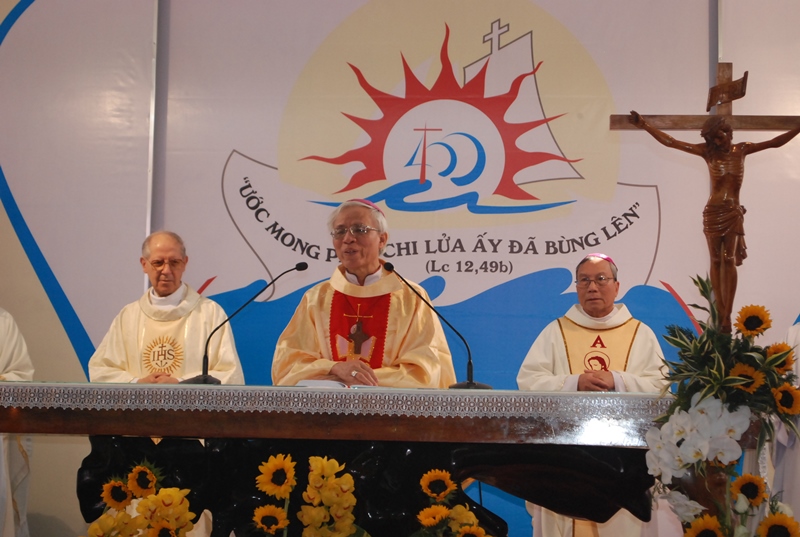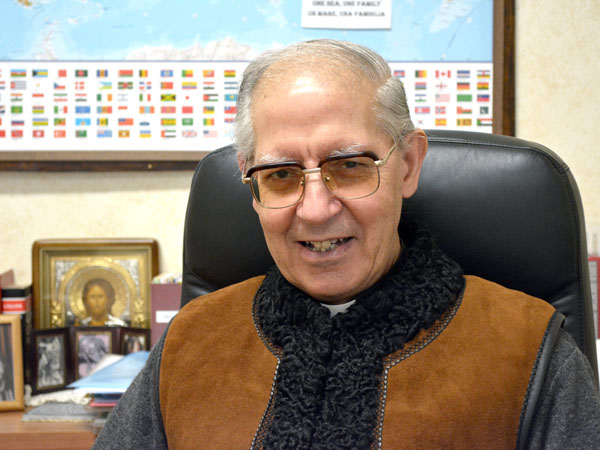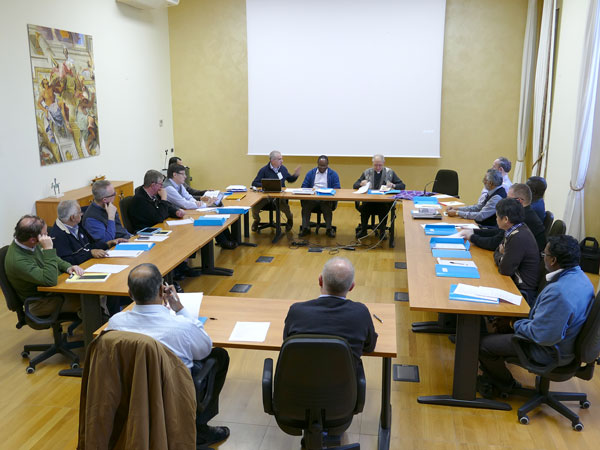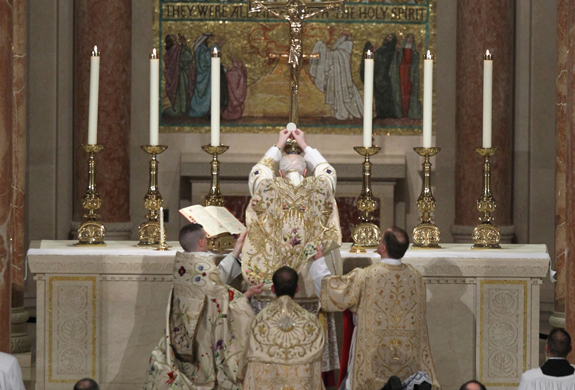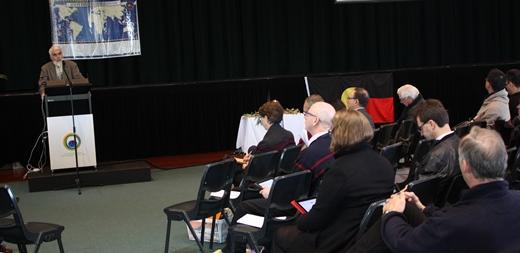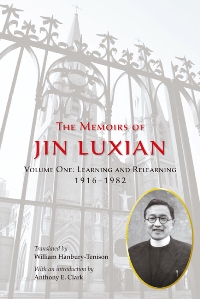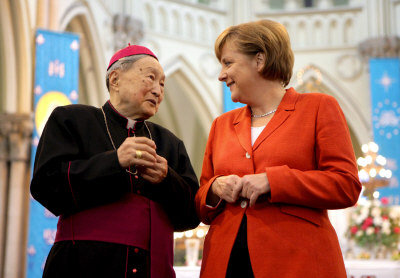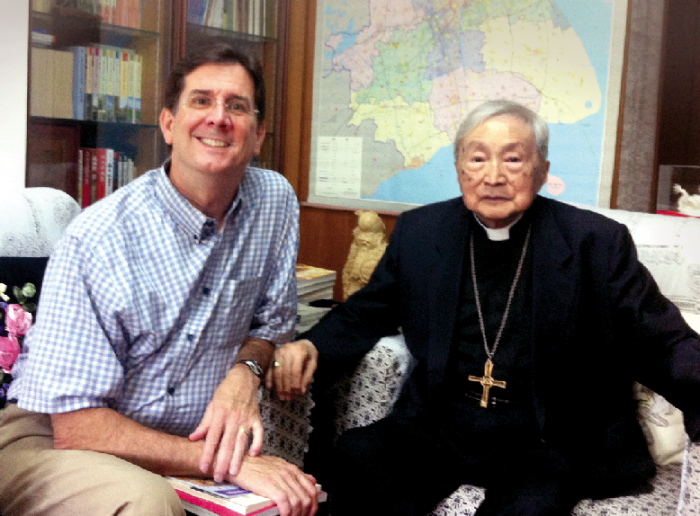by Nicholas Clifford
Bishop Aloysius Jin Luxian has been one of the most important and controversial figures in modern Chinese Catholicism. Born into a Catholic family in Shanghai in 1916, he was educated by the French Jesuits in that city and became a Jesuit himself, living through a tumultuous time in China’s history, a witness to war and revolution, to the triumph of Mao’s Communists in 1949 and the vicious campaigns mounted against China’s Christians (to say nothing of other perceived enemies of Maoism) in the years that followed.
Jailed in 1955, he emerged only in 1982 as Maoist Communism was giving way to a powerful state capitalism disingenuously waving the revolution’s red flag. By that time, Chinese Christians, both Protestant and Catholic, had been divided into two groups. One was underground, in the Catholic case maintaining a traditional loyalty to Rome. The other came to terms with the regime in the Catholic Patriotic Association. After Jim’s release in 1982, he became not only one of the leaders of this latter movement, but as the C.P.A.’s bishop of Shanghai, proved himself very successful in rebuilding Shanghai Catholicism, reopening churches, schools and seminaries, and attracting (or re-attracting) parishioners. To some (including many of his fellow Jesuits) he was a traitor; to others, a man of extraordinary accomplishments under extraordinarily difficult circumstances.
This volume, splendidly translated by William Hanbury-Tenison, takes the story only up to Jin’s return to Shanghai from jail in 1982. His accounts of his youth and education under the French Jesuits in Shanghai are very interesting, as are those of his studies abroad after the Second World War in Rome and in France. Sometimes gently and sometimes not, he chides the French clerical establishment in Shanghai for seeking to hold onto power and ignoring the efforts of men like Benedict XV and his nuncio in China, Celso Constantini, to encourage the indigenization of the church (Benedict’s “Maximum Illud” of 1919 is one of the key documents here).
I do not think he’s exaggerating. When the first Chinese bishops since the 17th century were named by Rome in the mid-1920s, a dispatch from the French minister that I found in the archives of the Quai d’Orsay warned that they would become heretics “par la pente naturelle de leur ésprit” (from their natural inclinations), and would use their positions for their own benefit. That seems to have been a common French view, both lay and clerical. And if Jin’s account is to be trusted, even after the coming of the Maoist regime in 1949, and the installation of Bishop Gong Pinmei in 1950, the French Jesuits sought to maintain control, presumably as what the Chinese call houtai laoban, or backstage manipulators.
Not that it did much good. By the early 1950s most foreign missionaries, Protestant and Catholic, either fled China, were expelled or were jailed. As long as he could, Gong led an effort to prevent the regime from taking over the city’s Catholicism, an episode described in Church Militant, the masterful account of the period by Paul Mariani, S.J. By September 1955, however, a series of sweeping arrests brought independent Shanghai Catholicism pretty much to an end. Gong and Jin themselves were among the many arrested and jailed, and much of the latter half of the book is given over to Jin’s prison years, with endless interrogations and forced confessions of supposed activities against the regime. He kept his faith alive, however, and though the book ends with his release in 1982, a few years later, at the urging of his former captors, he formally joined the C.P.A. “In another twenty years,” they told him, “you will go to heaven, and Catholicism will simply die out in China. You will bear responsibility for that…. You should take responsibility for the Church.” He did so, becoming bishop of Shanghai under C.P.A. auspices and going about the task of rebuilding Catholicism there, with remarkable success until his death in 2013.
Whatever Jin’s ecclesiastical opponents may have said of him earlier, his relations with Rome were patched up when the Vatican ultimately recognized him as bishop coadjutor. Nevertheless, he remains a figure of controversy because of his dealings with Beijing; and while C.P.A. members in Shanghai may have something that looks a bit like religious freedom, the so-called “underground” church, which has never renounced allegiance to Rome, continues to be watched, harassed and persecuted.
For much of this, Jin’s record remains extraordinarily valuable. But not definitive. Memoirs are not, properly speaking, history. Rather, they are part of the raw material of history, waiting for historians to come along and incorporate them into their broader research, seeking to arrive at clearer and more accurate depictions of the past than have earlier existed. By their very nature, memoirs must be personal and indeed parochial, setting forth the views of single individuals. More than that-and this is a quality they share with all historical writing-they can be deceptive, even though this may not be the intent of the writer, and even though every event they record did actually happen.
Jin’s book, he tells us, was written entirely from memory, since he had lost all his papers at the time of his arrest and knew the dangers of keeping correspondence or a journal. Add to these uncertainties the fact that it was published in China, hardly a leading center of press freedom. His translator told me in an email that he worked from a privately printed copy of the memoirs that had not undergone censorship by the authorities of the People’s Republic of China, though Jin may well have censored it himself, well knowing what he could and could not say. Parts of the book sound like echoes of Beijing’s standard phrases and judgments. When, for example, Jin refers to the “Gong Pinmei counter-revolutionary clique,” or sees Bishop Gong as a front for the French Jesuits, is he reflecting his own beliefs, or does he trust us to discover a meaning beyond the words themselves? He is quite ready to denounce the Cultural Revolution (1966-76), though that is almost orthodoxy in today’s People’s Republic of China, but he says nothing of Mao’s catastrophic famine of the late 1950s, which carried away from 30 million to 45 million victims in three years.
It is impossible to know the answers to these questions. Read his work and decide for yourself. But read Mariani’s Church Militant as well, which is based on a wide range of official and unofficial sources, both Chinese and Western. Bear in mind also that the Chinese state’s wish to control certain ecclesiastical affairs is by no means a recent Communist invention. In 845, under the Tang dynasty, a widespread persecution of Buddhism and other religions (including Nestorian Christianity) broke out, at least in part, because they were seen as foreign and perhaps even a danger to the established order. Thereafter the state, when it could, kept a wary eye on such matters. Nor, for that matter, is the church’s acquiescence-forced or otherwise-to the cultural and political norms of the day anything new. The road to Canossa has not always been a one-way street. Think, for example, of the Gallican articles of 1682 or, much more recently, the Emperor Franz Josef’s veto of Cardinal Mariano Rampolla as the elected successor of Pope Leo XIII in 1903 or Francisco Franco’s power to name his own bishops in Spain.
I am not a church historian, and will leave the similarities and differences here to others. Bishop Jin Luxian has great admirers, both within the church and beyond it. Did he make the right choice in accepting state supervision of his eminently successful rebuilding of Shanghai Catholicism? It is very tempting to say that he did. Now that he has died, however, it is unlikely that we will ever see the second volume of these memoirs, or know the circumstances behind their publication even if they appear. Nor is the story over yet. Shortly after Jin’s death in April 2013, his successor as bishop, Ma Daqin, resigned his position in the C.P.A., and was thereupon ousted by the regime. His status and whereabouts are something of a mystery today.
Nicholas Clifford is an emeritus professor of history at Middlebury College in Vermont.



